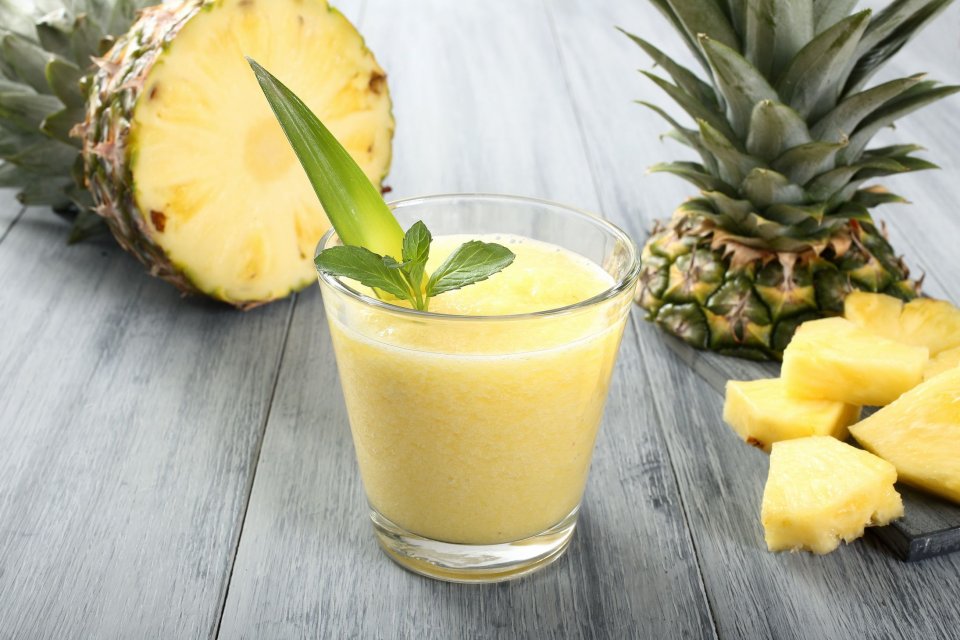You might’ve heard that pineapple triggers miscarriage or labor, but this isn’t true. Here, an OB-GYN and registered dietician dispel the myths surrounding this sweet tropical fruit.
Parents-to-be are often concerned about what’s safe to eat during pregnancy (and what’s not). You know to avoid raw fish, excess caffeine, and soft cheese, but you might’ve also been told to stay away from pineapple. Is there merit behind this advice?
Not really, according to Neha A. Deshpande, MD, a board-certified OB-GYN with Princeton Medical Group. “There’s a myth about this tropical fruit that it can induce miscarriage or labor, but that’s not true,” she says.
On the contrary, pineapple has several benefits if eaten in moderate amounts; it’s full of vitamins, antioxidants, and fiber that support a healthy pregnancy. Still, certain people might want to avoid pineapple because of its association with acid reflux and high sugar content, which can negatively impact those with gestational diabetes.
Keep reading to learn about the safety of pineapple while pregnant, the benefits of this tropical fruit, and situations that might warrant you to limit your intake.
The Safety of Pineapple While Pregnant
Like most other fruits, pineapple is safe to eat in moderation during pregnancy, says Dr. Deshpande. You might’ve heard an old wives’ tale saying that pineapple can cause contractions or labor, but there’s no robust evidence to support this.
The myth stems from the fact that pineapple contains bromelain. This digestive enzyme has actually been linked to miscarriage—but only if you consume it in large quantities, says Dr. Deshpande.
Research has found that bromelain is mainly found in the stem and core of the pineapple, which we don’t eat. It would need to be consumed in very high doses to cause adverse effects during pregnancy, so a normal serving size won’t have any effect. This is especially true since you only eat the pineapple flesh, which has relatively low levels of the enzyme.
“Pregnant people can safely enjoy pineapple,” says Frances Largeman-Roth, RDN, a nutrition expert, mother of three, and author of Feed the Belly: The Pregnant Mom’s Healthy Eating Guide and the forthcoming Everyday Snack Tray.
Fun Ways to Eat Pineapple
Looking to incorporate pineapple into your pregnancy diet? Here are some tasty ideas.
- Blend pineapple—either fresh or frozen—into a smoothie
- Mix pineapple into a fruit salad
- Use pineapple as a topping for yogurt, oatmeal, ice cream, or even pizza
- Whip up pineapple salsa
- Grill pineapple slices as a side dish

Pineapple, along with other fruits and veggies, can be a nutritious part of your diet during pregnancy. “Pineapple provides a rich source of vitamin C, antioxidants, dietary fiber, and many other healthy vitamins,” says Dr. Deshpande.
Here are some benefits of pineapple for expectant parents:
- Pineapple has anti-inflammatory properties.
- It contains fiber that can fight constipation (an unfortunate side effect of pregnancy for some people).
- Pineapple is a great source of minerals, nutrients, and antioxidants. “The delicious fruit provides a wealth of vitamin C, as well as folate, iron, and magnesium,” says Largeman-Roth.
- The bromelain in pineapple has therapeutic benefits. According to one study, it can help with the treatment of bronchitis, sinusitis, diarrhea, surgical pain, and more.
- Pineapple is mostly comprised of water, which can help prevent dehydration.
Note that, despite the benefits of bromelain, you should not take bromelain supplements while expecting.
Should Any Pregnant Person Avoid Pineapple?
Like any food, pineapple should be eaten in moderation during pregnancy. And for some groups, including those with a higher risk of gestational diabetes, it might be best to limit it even more.
“It’s one of the sweeter fruits and has more sugar, so should be eaten in moderation to avoid gestational diabetes and excessive weight gain,” says Dr. Deshpande. She adds that patients with existing diabetic conditions should also stay away from pineapple (or seek guidance from a health care professional before consuming it regularly).
Pineapple is also an acidic fruit, and it can worsen pregnancy heartburn in some people. If you notice that pineapple triggers your heartburn or acid reflux, you might consider limiting the amount you consume. You can also try eating the pineapple with other foods.
People should also avoid eating pineapple if they’re allergic. Food allergy symptoms will occur shortly after ingesting the pineapple, and they might include:
- Skin rash
- Itching or swelling of the lips, throat, and tongue
- Runny nose
- Abdominal pain, nausea, or diarrhea
- Dizziness
- Coughing or wheezing
People with latex allergies are more likely to suffer from pineapple allergies.
Pregnancy Food Safety
If you’re wondering if a food is safe to eat while pregnant, it’s best to consult with an OB-GYN or registered dietician who specializes in pregnancy. “Most foods are safe to consume during pregnancy and it’s smart to enjoy a variety of foods to get the most nutrients,” says Largeman-Roth.
